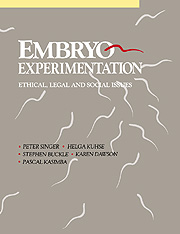Book contents
- Frontmatter
- Contents
- Foreword
- ACKNOWLEDGEMENTS
- INTRODUCTION
- PART 1 THE SCIENTIFIC ISSUES
- PART 2 THE ETHICAL ISSUES
- ARGUMENTS ABOUT THE STATUS OF DIFFERENT DEVELOPMENTAL STAGES
- ARGUMENTS FROM POTENTIAL
- EMBRYO RESEARCH AND WOMEN
- PART 3 CONTROLLING EMBRYO EXPERIMENTATION IN A DEMOCRATIC SOCIETY
- FORMING A PUBLIC POLICY
- LEGISLATION AND ITS PROBLEMS
- APPENDICES
- GLOSSARY
- NOTES ON CONTRIBUTORS
- INDEX
Foreword
Published online by Cambridge University Press: 05 June 2012
- Frontmatter
- Contents
- Foreword
- ACKNOWLEDGEMENTS
- INTRODUCTION
- PART 1 THE SCIENTIFIC ISSUES
- PART 2 THE ETHICAL ISSUES
- ARGUMENTS ABOUT THE STATUS OF DIFFERENT DEVELOPMENTAL STAGES
- ARGUMENTS FROM POTENTIAL
- EMBRYO RESEARCH AND WOMEN
- PART 3 CONTROLLING EMBRYO EXPERIMENTATION IN A DEMOCRATIC SOCIETY
- FORMING A PUBLIC POLICY
- LEGISLATION AND ITS PROBLEMS
- APPENDICES
- GLOSSARY
- NOTES ON CONTRIBUTORS
- INDEX
Summary
A few years ago an editorial appeared in the Journal of Medical Ethics under the title ‘Two concepts of medical ethics’. The writer distinguishes between ‘the obligations of a moral nature which govern the practice of medicine’ (Gordon Dunstan's definition in the Dictionary of Medical Ethics) and ‘the critical study of moral problems arising in the context of medical practice’. It is a useful working distinction; and we see it at work in this community.
‘The obligations of a moral nature which govern the practice of medicine’ arise in their acute and ultimate form in the relation between doctor or nurse and patient, at the bedside, in the laboratory. How these obligations are perceived and passed on is largely a matter for the members of the medical professions, however much they may listen to others, be influenced or controlled by them, be those others ethics committees containing members with skills and talents other than those of medical training, or be they legislators who believe themselves to have been charged by the community with the responsibility of controlling medical experimentation or care.
It is with the second sense, ‘the critical study of moral problems arising in the context of medical practice’, that this book, and behind it the Monash University Centre for Human Bioethics, is concerned. Of course they need each other.
- Type
- Chapter
- Information
- Embryo Experimentation , pp. vii - viiiPublisher: Cambridge University PressPrint publication year: 1990

